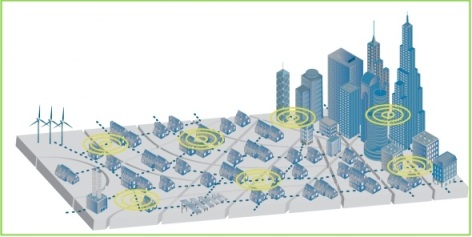What would happen when various individual virtual agents cooperate and process data through interdisciplinary systems?  According to an article of David Hunter Tow, Director of the Future Planet Research Centre, interactive virtual agents could end up playing a huge role in saving the planet and its evolution could grow exponentially.
According to an article of David Hunter Tow, Director of the Future Planet Research Centre, interactive virtual agents could end up playing a huge role in saving the planet and its evolution could grow exponentially.
Collaborative multi-agent systems, also called multi-agent cyber systems, often exceed the individual expert capabilities. When virtual agents interact in the form of a networked system, their collective intelligence level increases, and so does the level of their overall operational efficiency and problem-solving capacity.
Such collaborative multi-agent systems would contribute to future civilisation as their present real-life counterparts such as social insect colonies, the immune systems or the Web itself. They would save the planet by making complex operations and thus being applied as critical decision support for financial services, communicational processes and scientific engineering.
There are a few drawbacks though according to this paper Multi-Robot Management Framework based on the Agent Dual-Space Control Paradigm (2007):
- knowledge about a problem must be distributed among all agents
- complex protocols must be developed to support coordination between agents, while performing tasks, which require cooperation,
- if an agent is to work directly on a robot, an on-board computational units and communication devices must be very efficient.
However, when such virtual agents are interactive, their level of operational efficiency and problem-solving capacity should significantly improve. A prerequisite is that virtual agents should be able to respond to changed situations, have the ability to learn from experience and act independently to achieve its objectives.
For example to achieve realistic outcomes and forecasts of very complex behaviors such as traffic congestion, epidemics, and financial crashes, such innovative techniques are essential.
Other examples of multiagent cyber systems are:
- Simulators that can predict the interactions of a large city or even an entire planetary atmosphere
- Artificial intelligence techniques based on artificial life (AL) research such as AL mechanisms which incorporate neural networks, evolutionary algorithms and other advanced learning and optimisation techniques
- Rational agent programming
In conclusion, such simulations will not only be necessary, but also the result of the ability to predict the future and to be able to keep up with the volatile world, whether it is on a social, economic or environmental level. In future, multiple virtual agent systems can renew themselves continuously based on environmental changes. Therefore, these interdisciplinary systems or multi-agent cyber systems will have a huge impact on saving the planet and its evolution.

